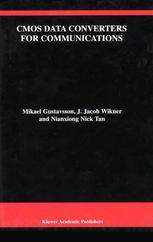

Most ebook files are in PDF format, so you can easily read them using various software such as Foxit Reader or directly on the Google Chrome browser.
Some ebook files are released by publishers in other formats such as .awz, .mobi, .epub, .fb2, etc. You may need to install specific software to read these formats on mobile/PC, such as Calibre.
Please read the tutorial at this link: https://ebookbell.com/faq
We offer FREE conversion to the popular formats you request; however, this may take some time. Therefore, right after payment, please email us, and we will try to provide the service as quickly as possible.
For some exceptional file formats or broken links (if any), please refrain from opening any disputes. Instead, email us first, and we will try to assist within a maximum of 6 hours.
EbookBell Team

0.0
0 reviewsCMOS Data Converters for Communications distinguishes itself from other data converter books by emphasizing system-related aspects of the design and frequency-domain measures. It explains in detail how to derive data converter requirements for a given communication system (baseband, passband, and multi-carrier systems). The authors also review CMOS data converter architectures and discuss their suitability for communications. The rest of the book is dedicated to high-performance CMOS data converter architecture and circuit design. Pipelined ADCs, parallel ADCs with an improved passive sampling technique, and oversampling ADCs are the focus for ADC architectures, while current-steering DAC modeling and implementation are the focus for DAC architectures. The principles of the switched-current and the switched-capacitor techniques are reviewed and their applications to crucial functional blocks such as multiplying DACs and integrators are detailed. The book outlines the design of the basic building blocks such as operational amplifiers, comparators, and reference generators with emphasis on the practical aspects. To operate analog circuits at a reduced supply voltage, special circuit techniques are needed. Low-voltage techniques are also discussed in this book.
CMOS Data Converters for Communications can be used as a reference book by analog circuit designers to understand the data converter requirements for communication applications. It can also be used by telecommunication system designers to understand the difficulties of certain performance requirements on data converters. It is also an excellent resource to prepare analog students for the new challenges ahead.